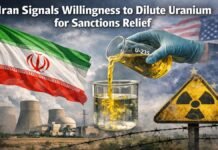
Key Points
- US President Donald Trump has identified 23 countries, including India, Pakistan, and China, as major illicit drug-producing or transit nations.
- The list was submitted to the US Congress in a “Presidential Determination” for Fiscal Year 2026.
- Five countries Afghanistan, Bolivia, Burma (Myanmar), Colombia, and Venezuela were designated as having “failed demonstrably” to meet their anti-drug obligations.
- China has been singled out as a primary source of precursor chemicals used to produce synthetic opioids like fentanyl, which are fueling a national emergency in the US.
- The report clarifies that inclusion on the list is not necessarily a reflection of a government’s efforts but is based on geographic, commercial, and economic factors.
Washington D.C.: In a formal memorandum to the US Congress, President Donald Trump has identified 23 nations as major countries for illicit drug production or trafficking. The annual “Presidential Determination on Major Drug Transit or Major Illicit Drug Producing Countries” for Fiscal Year 2026 includes India, Pakistan, China, Afghanistan, and Mexico.
The White House stated that the production and transit of illegal drugs and the chemicals used to create them by these nations pose a significant threat to the security of the United States. The full list of countries is: Afghanistan, The Bahamas, Belize, Bolivia, Burma, China, Colombia, Costa Rica, the Dominican Republic, Ecuador, El Salvador, Guatemala, Haiti, Honduras, India, Jamaica, Laos, Mexico, Nicaragua, Pakistan, Panama, Peru, and Venezuela.
Five Nations Accused of Failing to Cooperate
The presidential report specifically designates five countries for having “failed demonstrably” in the past year to adhere to their international counternarcotics agreements: Afghanistan, Bolivia, Burma, Colombia, and Venezuela. The US has urged these nations to intensify their efforts to combat drug production and trafficking.
However, the State Department clarified that a country’s presence on the list is not automatically a judgment of its government’s counter-narcotics efforts or level of cooperation with the US. The determination is often based on a combination of geographic, commercial, and economic factors that facilitate drug production or transit, even in countries with robust law enforcement measures.
Spotlight on China and the Fentanyl Crisis
The US has issued a stern warning regarding China’s role in the global drug trade, identifying it as a primary source for precursor chemicals used to manufacture fentanyl and other synthetic opioids. These substances are major contributors to a drug crisis in the United States, which has become a national emergency. Drug overdoses are now the leading cause of death for American citizens between the ages of 18 and 45, with synthetic opioids like fentanyl being the primary driver.
In early September 2025, the U.S. Department of the Treasury sanctioned a China-based chemical company, Guangzhou Tengyue Chemical Co., Ltd., for its involvement in the manufacture and sale of synthetic opioids to Americans. While China remains the main source of these chemicals, a US indictment in January 2025 also charged two Indian chemical companies with supplying fentanyl precursors to the US and Mexico.




















































